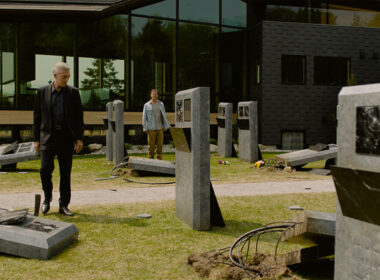Luca Guadagnino’s adaptation of William S. Burroughs autobiographical novel Queer is a work of unflinching sadness from its first sequence – a middle aged gay man drunkenly looking for a night of love on the streets of Mexico City – to its last frame of that same man, now aged, embracing his consuming loneliness. The end credits play to an original song by Trent Reznor and Atticus Ross, performed by Brazilian giant Caetano Veloso – “How can a man who sees and feels // be other than sad”, which he sings in that delicate voice of his halfway between a lullaby and a heartbreak. But how can a man who sees and feels be other than sad?
If you’re familiar with the book, you know partially what to expect. William (Daniel Craig) is a rich American dilettante in Mexico City, in the middle of a community of other rich, gay, American dilettantes who fled to that country to avoid rampant homophobia at home. He spends his time hopping from bar to bar, talking to his friend Joe (an unrecognisable and delightful Jason Schwartzman) and trying to find a new companion to spend the night with. When the film starts, William is already a loner detached from the rest of his community, roaming the streets like a ghost – until he finds Eugene (Drew Starkey), a young student who catches his eye but opens the question – is he queer?
William and Eugene’s relationship is often too one-sided and destructive, and in desperation, the two set off on a road trip to the Peruvian jungle in search of a psychedelic root the Soviets believe can help a person read minds. William, struggling with his heartache and heroin addiction, drags Eugene to the confines of the Earth, like he’s pushing him down to the confines of his sadness and insecurities.
Burrough’s self-destructive account of his sexuality has meant that his work is rarely included in queer literature. He writes, with the tears and sweat, a tragic account of a man trapped in his own nature. I think it’s unfair to say he generalises, he writes the rest of the community as a bubbling and thriving group of men who found their own place in the world – it’s just him, one who sees and feels, that he cannot escape the fruits of his upbringing.
What Guadagnino, who is openly gay, and his writer Justin Kuritzkes, do is reclaim the story. Guadagnino designs the world in an almost fantastical way, using sets and miniatures, like Fassbinder’s gay masterpiece Querelle. It’s a visual treat that enhances the film’s romantic despair. At the same time the soundscape is often anachronistic, with three Nirvana songs (including a version of All Apologies by Sinead O’Connor), Prince, Radiohead, Orville Peck, Harry Nillson and Nat King Cole. Immaculately curated when paired with Guadagnino’s eerie camera movements.
All of this would be for nothing if Daniel Craig wasn’t so perfect for the role. There’s a moment right at the start when William catches the eye of Eugene and performs an embarrassingly exaggerated bow. One of those “it felt like a good idea at the time” moments that quickly develops into “why did I just do that?”. And Craig sells that moment so well, embodying the shame and pity of seeing your friend embarrassing themselves in front of the person they fancy. It’s a small moment, and Craig brings more intensity in other scenes, but it’s in the simplicity of these that he reveals his power.
Queer is cinematic joy. It’s melancholic and heartbreaking, but so well composed and thoughtful. It made me cry and should make everyone cry. The comparisons with Fassbinder’s Querelle are not too far-fetched. That is also a film over-stylised that overtly faces the personal difficulties of dealing with one’s sexuality. A thread that weaves around its character like an unavoidable catalyst for pain and gloom. Like Sinead O’Connor singing the words of Kurt Cobain: “what else could I be? // all apologies // what else could I say? // everyone is gay // what else could I write? // I don’t have the right”.
Verdict: 4.5 out of 5
For auto-destructive hopeless romantics and emphatic loners.




